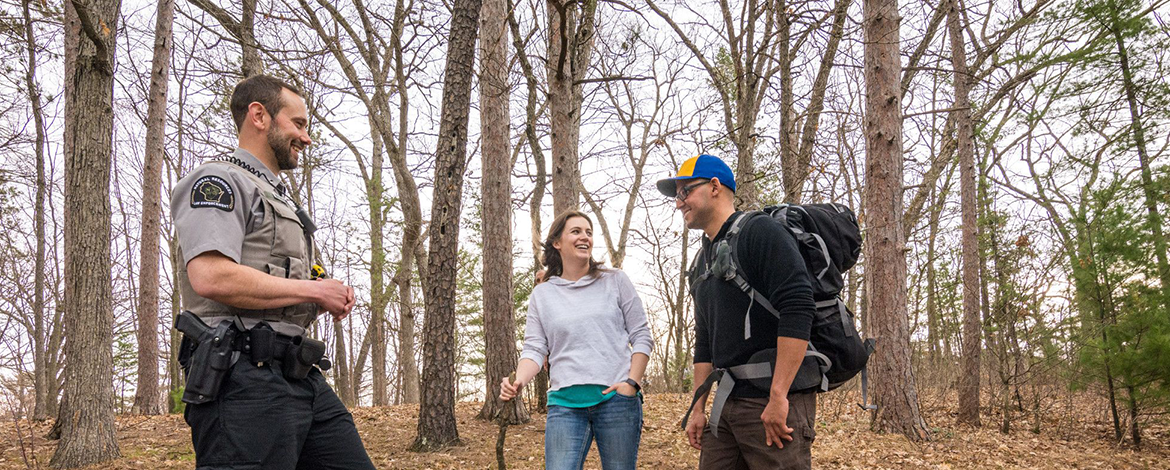A Day in the Life of a Conservation Warden

A career unlike any other
The conservation warden career brings with it an unmatched level of independence and unique opportunities to serve all people. We are a voice for our resources, a voice for our communities and a protector of the vital natural resources we all depend on. The variety and flexibility of the conservation warden career provides incredible fulfillment for our staff. Each day and season brings new challenges and investigations, opportunities to teach and help, and interactions with new people. While warden staff are expected to work every other weekend, our wardens often have the flexibility to set and adjust their own schedules. Wardens are also expected to respond “after hours” as emergencies arise. This scheduling flexibility allows wardens to meet the needs of their communities and be responsive to public safety and natural resources issues, regardless of what time they occur.
Daily Duties
Wardens spend significant amounts of time proactively patrolling and responding to community concerns. They also regularly work collaboratively with other DNR staff, including scientists, biologists, engineers, customer service staff and community partners in order to solve problems and protect natural resources. All wardens are supplied state-owned patrol vehicles with built-in computers and other technology to help them get their work done regardless of their location. On any given day, wardens will most likely engage in several of the below responsibilities. These activities will often vary by the season.
- Hunting, fishing, trapping, snowmobiling, ATVing and boating enforcement
- Enforcing all state laws in state parks, forests and other DNR-owned lands
- Investigating environmental violations, hazardous spills and timber theft
- Investigating serious and fatal recreational vehicle accidents
- Attending, teaching and/or presenting at community meetings, outdoor recreation safety classes, Learn To Hunt/Fish events and outdoor expos
- Assisting other law enforcement agencies when requested
- Enforcing captive wildlife laws
- Responding to natural disasters, public safety emergencies and Governor’s Office requests
DNR Property-Assigned Wardens
The Conservation Warden Service employs approximately 20 property-specific conservation wardens across the state. These wardens have the same authority and receive the same training, pay and benefits as field conservation wardens but focus their patrols, investigations and community outreach in major Wisconsin state parks and forests. The DNR manages 10 high-use state properties (state parks and forests) that require the attention of property-specific conservation wardens. These high-use properties include Devil's Lake State Park, Willow River State Park, Northern Highland-American Legion State Forest, Peninsula State Park, High Cliff State Park, Kohler-Andrae State Park, Kettle Moraine State Forest Northern and Southern Units, Richard Bong State Recreation Area and Governor Dodge State Park. In addition to providing law enforcement, search and rescue and public outreach services on these major state properties, property-specific wardens may also conduct more traditional conservation warden patrols and duties off-property during the fall and winter seasons.
Variable And Flexible Schedule
Wardens have variable schedules, which include scheduled shifts in state parks and forests. When not scheduled in parks or forests, wardens are given the freedom to adjust their own work schedules as needed, which is why it is crucial that any potential candidate be self-motivated, responsible and able to prioritize duties. Wardens are scheduled to work at least every other weekend, the major hunting or fishing season openers, and most summer holidays. Additionally, wardens are allowed a specified amount of overtime which they must manage throughout the year.
Life Outside Of Work
While the people of and visitors to Wisconsin rely on a highly responsive and committed conservation warden team, we also understand it is essential for our warden staff to enjoy a life outside of work. Schedule flexibility and vacation time aid our wardens in finding this balance.
Demanding Career
Although wardens work as part of a larger team, wardens are generally responsible for covering most calls in their assigned area. The specialized skills and equipment that wardens possess make them unique assets in their communities, and they may be called upon to assist at any time, day or night. A warden’s schedule will also likely involve overtime throughout the year.
- Warden Recruiting Updates - Want to know when wardens are recruiting and hiring and receive our newsletter?
